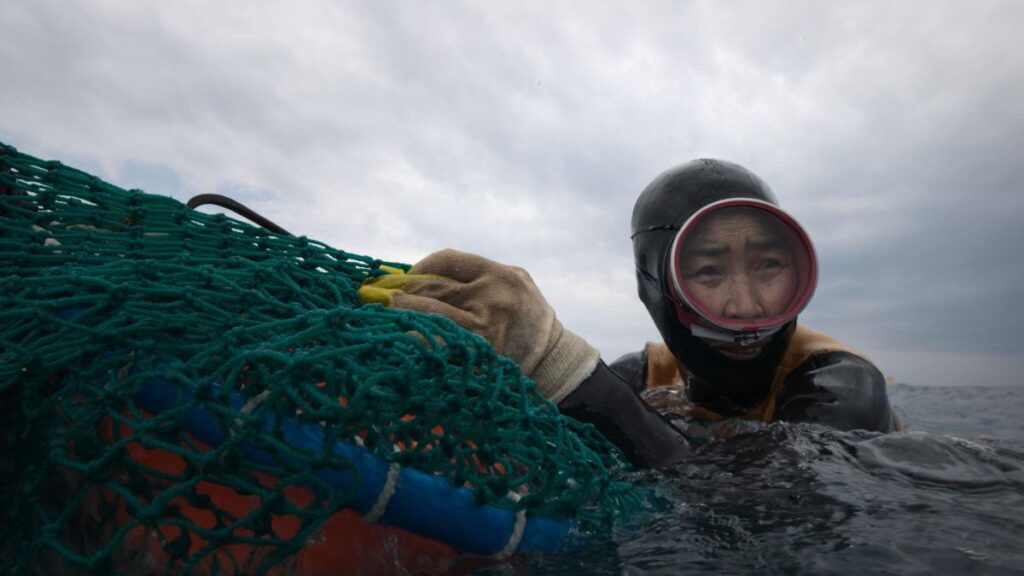The myth of mermaids has captured human imagination for centuries, but what if a real-life version exists among the haenyeo divers of South Korea? These remarkable women, who reside on Jeju Island, have mastered the ancient practice of free-diving to harvest seafood without oxygen. With a history rooted in generations of female divers, haenyeo culture is characterized by its vibrant community spirit, strength, and resilience. However, this unique way of life faces several challenges, as many of the current practitioners are elderly, and younger generations are increasingly turning away from the profession. The potential impacts of climate change and marine pollution further endanger their livelihood and skills. In response to this pressing situation, filmmaker Sue Kim teamed up with Malala Yousafzai, a Nobel Peace Prize laureate and advocate for female education, to document the haenyeo story and raise awareness about their struggles.
Filmmaker Sue Kim recalls her childhood experiences of encountering the haenyeo, whose boldness and confidence captivated her from a young age. Growing up as the daughter of Korean immigrants, she was struck by the unique aura of the divers, who embody a form of Korean womanhood that she aspired to emulate. Malala Yousafzai, upon discovering the haenyeo’s existence and the urgency of preserving their legacy, joined the project as a producer. The need to document the haenyeo’s experiences became increasingly crucial, especially after Kim learned that the current generation might be the last to engage in this traditional role. The documentary serves not only as a record of their ways of life but also as an exploration of the environmental, social, and economic challenges they face.
The film illustrates the daily routine of these skilled divers, who begin their work at 6 a.m. and dive multiple times for hours, showcasing their exceptional physical fitness and dedication. Historical accounts suggest that fewer men participated in fishing, sparking a shift toward women assuming the role of divers. The haenyeo communities are closely knit and comparatively isolated from urban areas, which made gaining their trust essential for Kim in filming this documentary. During her two weeks with them, she learned about their concerns regarding the decline of their culture and the ecological threats to the oceans, where they earn their livelihoods. By ensuring the women felt seen and celebrated instead of pitied, Kim fostered strong connectivity, referring to them as heroes, not subjects of a ‘sad grandma trope.’ This change in perspective helped in creating a more authentic narrative surrounding the haenyeo’s identities and values.
The perils of the profession are immense, as there is no insurance for diving, making it a dangerously liberating yet hazardous career. The women of the haenyeo community are also facing the broader existential threat from climate change, which is transforming marine ecosystems, resulting in diminished sea life. Compounding this issue is their opposition to the planned discharge of radioactive water from Japan’s Fukushima nuclear plant—a controversial topic that has prompted protests and advocacy from the haenyeo. Although scientific authorities insist the release is safe, doubts within the scientific community surrounding potential impacts on the ocean abound, leading to a broader discourse about ecological conservation. The haenyeo’s commitment to sustainable harvesting, which eschews oxygen tanks in favor of breath-holding, reflects their respect for the marine life they collect and its importance to the ocean’s ecosystem.
Despite the commitment of the older haenyeo women, there remains a growing concern about the future viability of their tradition. Current initiatives, including a training school established in the early 2000s, have yielded minimal results, with only a small percentage of attendees going on to become active divers. However, the documentary relays a sense of hope through stories of young women from other islands who are embracing the profession. These women can leverage social media to attract interest in the traditionally labor-intensive work, emphasizing the flexible schedule it provides. Establishing intergenerational relationships, the younger divers refer to the older women as “aunties,” fostering a sense of community that merges the past with a potential future.
Both Sue Kim and Malala Yousafzai draw inspirational lessons from the haenyeo’s collective resilience and the sense of empowerment that comes with their unity. For Yousafzai, the collaboration emphasizes the global struggles faced by women and their shared advocacy efforts. The haenyeo’s story is not just about preserving a unique cultural practice; it is a manifestation of female strength, courage, and the unyielding spirit required to adapt and confront modern challenges. Ultimately, this documentary aspires to inspire future generations of girls, encouraging them to believe in their potential and pursue their own dreams, whether that might involve diving beneath the waves or overcoming personal limitations. The documentary “The Last of the Sea Women,” which showcases these powerful narratives, will be available on Apple TV+ from October 11, 2024, offering a platform for crucial dialogues surrounding tradition, gender roles, environmental advocacy, and the quest for identity in a rapidly changing world.

